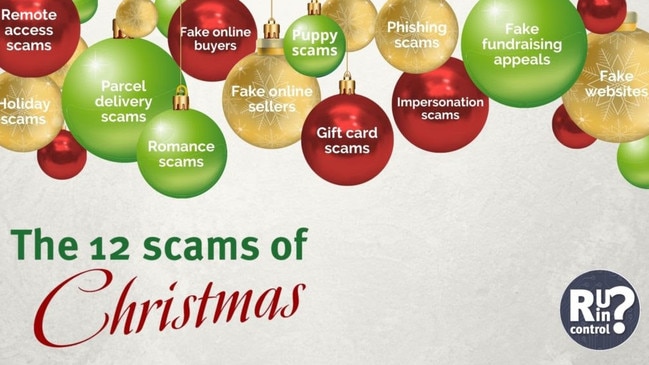Scammers ripped us off $634m in 2019 – don’t be next victim
Telltale signs of an online scam include a website with minimal information about delivery, returns or contact details.

Gladstone
Don't miss out on the headlines from Gladstone. Followed categories will be added to My News.
Police are warning Central Queenslanders not to be complacent online over the festive season as it is an opportune time for scammers to try to defraud you of your savings.
Scammers ripped Australians off to the tune of $634 million in 2019 according to the Australian Competition and Consumer Commission.
As part of its Christmas Cybersafety campaign the Queensland Police Service issued the following warning about scammers.
“On the night befraud Christmas Eve, the Financial and Cyber Crime Group want to remind you to be aware of elf-ish scammers this festive season,” a police spokesman said.
Festive puns aside, Queensland police said online fraudsters and scammers are becoming more sophisticated every year.
The Financial and Cyber Crime Group is reminding Queenslanders to be aware of grinch-like scammers and be sure to stay alert to scams such as fake websites.
The FCCG said there were 12 types of scams; fake websites, phishing scams, parcel delivery scams, fake sellers on online classifieds, fake buyers on online classifieds, puppy scams, free gift card scams, holiday scams, impersonation scams, fake charities or fundraising appeals, romance scams and remote access scams.
“Scammers often set up fake online stores and social media pages, claiming to sell popular items at incredibly low prices,” the FCCG said.
“If a product’s advertised price seems too good to be true, there’s a very good chance it is.
“Other telltale signs of an online scam include a website with minimal information about delivery, returns or contact details, and requests to pay via unsecure and unusual methods.”
FCCG Detective Inspector Vince Byrnes said scammers often set up a fake online store with products at ‘too-good-to-be-true’ prices to attempt to trick shoppers into buying stock they don’t have.
“It is best to use online retailers or brands that you are aware of, trust and that offer buyer protections,” said Detective Inspector Byrnes.
“Be very wary of shopping websites that don’t use secure payment methods and offer big discounts for direct payment into accounts.
“And please, never pay anything via cryptocurrency.”

Phishing scams are another method that regularly catches people out said the FCCG.
“While retail marketing can go into overdrive at this time of year, if you receive an unsolicited email or text message, consider the possibility that it could be fraudulent,” the FCCG said.
“Scammers often use this method – known as phishing emails or smishing for texts or instant messaging to drive people towards a fake website.
“From here, scammers may attempt to steal money or personal data, or may infect your device with malware.
“Avoid clicking on links and if you are unsure about the message authenticity, best to delete it and check it by calling the organisation using contact details from a verified website.”
Parcel delivery scams are a type of phishing and fake website scam, where scammers use the name and branding of well-known delivery companies, to send fake ‘missed delivery’ notices to potential victims.
“These can even appear in the same message stream as legitimate company messages as scammers can ‘spoof’ phone numbers,” the FCCG said.
“Always think and check before you click a link.”
Detective Inspector Byrnes said most people expected parcels at this time of the year.
“Be careful about online links and never download attachments,” Detective Inspector Byrnes said.
“To check that a parcel delivery message is legitimate, check the tracking number on the delivery company website or call them directly.”
To learn more about scams, visit the Scamwatch website or the Queensland Police Service’s R U in Control campaign.
Rules to avoid scams:
> If it sounds too good to be true it probably is.
> Always use secure payment methods
> Don’t click on unsolicited texts or emails saying you have won a prize or have something to collect
> Never allow a person you haven’t confirmed the identity of to access your computer remotely
> Always check the legitimacy of phone numbers, websites and email addresses- they could be fake.
> Report any scams to Scamwatch or Queensland Police.
More stories,
COVID hotspot guests staying on CQ island
How Australia’s Christmas could have been virus-free
’FIRE JELLY’: Reported box jellyfish found on regional beach


